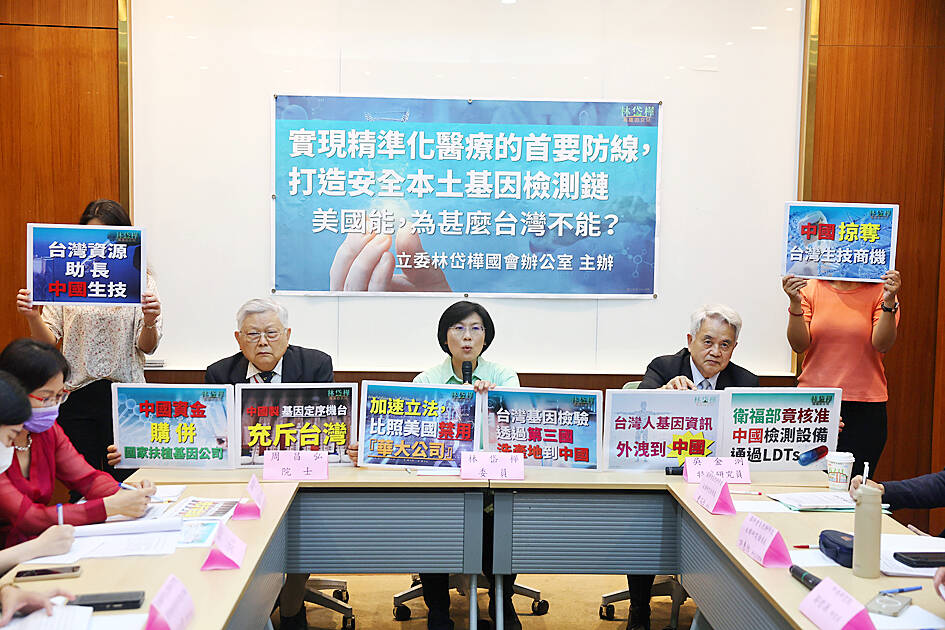Taiwan’s laws should be amended to help prevent genetic data from leaking to China and to establish a domestic genetic testing industrial chain, Democratic Progressive Party (DPP) Legislator Lin Tai-hua (林岱樺) said yesterday.
Precision medicine has become a global trend in the past few years, while Taiwan’s medical sector has been promoting genetic testing in advanced precision and personalized medicine to improve treatment efficacy and medical resource utilization, Lin told a news conference in Taipei.
However, media have reported that Chinese gene company BGI Genomics Co Ltd, which sells one of the most popular prenatal tests in the world, has harvested genetic data from millions of women, and is facing scrutiny from regulators in Australia, Canada, Germany and other countries, she said.

Photo: CNA
Human genetic data are a fundamental resource for scientific research and valuable for the biomedical industry, but there are concerns that genetic data collected in Taiwan might be leaked to China, she said.
DNA sequencing machines in Taiwan being made in China, specimens from genetic testing being sent to China from third countries for sequencing, the government granting Laboratory Developed Test certification to Chinese testing devices, state-supported gene companies merging with firms that the Chinese government has stakes in and genetic data of Taiwanese being leaked to China are among the concerns, Lin said.
Wu Jen-leih (吳金洌), a visiting fellow at Academia Sinica’s Institute of Cellular and Organismic Biology, said that the source of genetic data leaks is the Chinese machines used for gene sequencing.
Sometimes specimens are sent directly to China or other countries to be sequenced, Wu said.
National security might be affected if the data are used for destructive purposes, he said.
Whoever controls the information has an advantage in biomedical technology development, but while many countries are adopting stricter measures regarding Chinese-made genetic testing products and sequencing machines, Taiwan lacks vigilance and even allowed several medical centers to install BGI Genomics sequencing machines, he said.
Chou Chang-hung (周昌弘), a professor in Academia Sinica’s Institute of Plant and Microbial Biology, said that Chinese firms have merged with gene companies in Taiwan, obtaining their databases and sending specimens to China.
The problem is similar to how seedlings and genomic data of special pineapple varieties being obtained by China harms Taiwanese agriculture, Chou said.
Regardless of how genetic data are acquired from Taiwanese, it seriously harms the genetic testing industry in Taiwan and supports the industry in China, when they are sent across the Taiwan Strait, he said.
The government should thoroughly investigate the use of Chinese genetic tests and sequencing machines in Taiwan, amend the law to control the export of genetic data, and support research projects to help Taiwan establish a domestic genetic testing industrial chain, Lin said.

An essay competition jointly organized by a local writing society and a publisher affiliated with the Chinese Communist Party (CCP) might have contravened the Act Governing Relations Between the People of the Taiwan Area and the Mainland Area (臺灣地區與大陸地區人民關係條例), the Mainland Affairs Council (MAC) said on Thursday. “In this case, the partner organization is clearly an agency under the CCP’s Fujian Provincial Committee,” MAC Deputy Minister and spokesperson Liang Wen-chieh (梁文傑) said at a news briefing in Taipei. “It also involves bringing Taiwanese students to China with all-expenses-paid arrangements to attend award ceremonies and camps,” Liang said. Those two “characteristics” are typically sufficient

A magnitude 5.9 earthquake that struck about 33km off the coast of Hualien City was the "main shock" in a series of quakes in the area, with aftershocks expected over the next three days, the Central Weather Administration (CWA) said yesterday. Prior to the magnitude 5.9 quake shaking most of Taiwan at 6:53pm yesterday, six other earthquakes stronger than a magnitude of 4, starting with a magnitude 5.5 quake at 6:09pm, occurred in the area. CWA Seismological Center Director Wu Chien-fu (吳健富) confirmed that the quakes were all part of the same series and that the magnitude 5.5 temblor was

The brilliant blue waters, thick foliage and bucolic atmosphere on this seemingly idyllic archipelago deep in the Pacific Ocean belie the key role it now plays in a titanic geopolitical struggle. Palau is again on the front line as China, and the US and its allies prepare their forces in an intensifying contest for control over the Asia-Pacific region. The democratic nation of just 17,000 people hosts US-controlled airstrips and soon-to-be-completed radar installations that the US military describes as “critical” to monitoring vast swathes of water and airspace. It is also a key piece of the second island chain, a string of

The Central Weather Administration has issued a heat alert for southeastern Taiwan, warning of temperatures as high as 36°C today, while alerting some coastal areas of strong winds later in the day. Kaohsiung’s Neimen District (內門) and Pingtung County’s Neipu Township (內埔) are under an orange heat alert, which warns of temperatures as high as 36°C for three consecutive days, the CWA said, citing southwest winds. The heat would also extend to Tainan’s Nansi (楠西) and Yujing (玉井) districts, as well as Pingtung’s Gaoshu (高樹), Yanpu (鹽埔) and Majia (瑪家) townships, it said, forecasting highs of up to 36°C in those areas